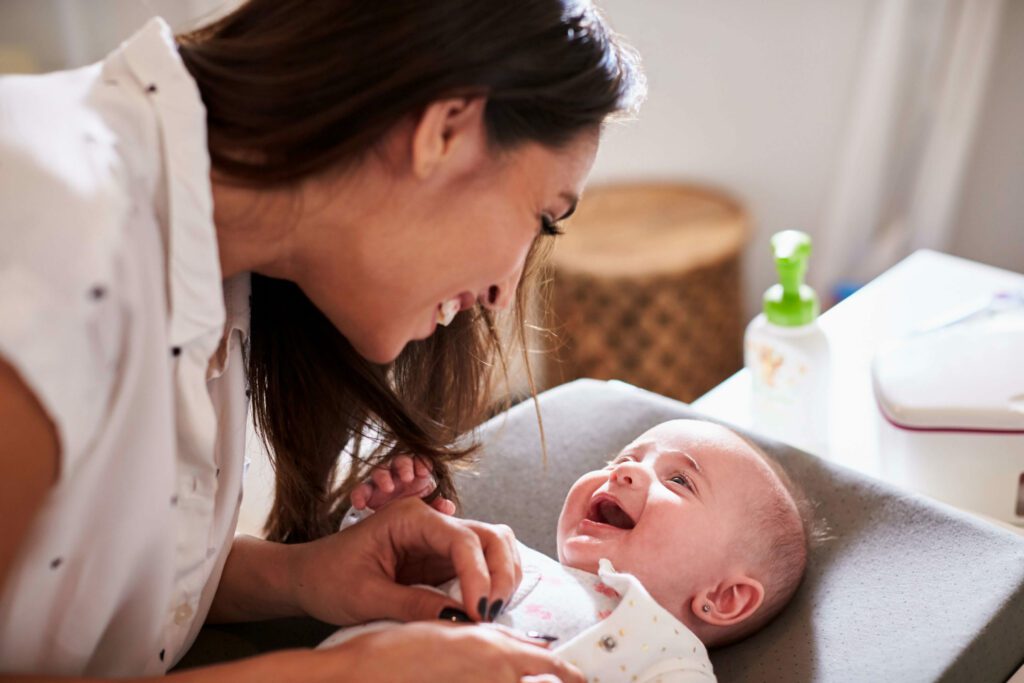Baby Development: Your 4 Month, 1 Week Old

Has your baby caught his or her first cold yet? If not, it may be around the corner.
For many babies, cold season is year-round. The immune system works by learning, meaning a baby must be exposed to a particular cold virus before developing immunity against that virus for the next time it appears. The bad news is that there are more than 200 viruses that can cause the common cold. That’s an awful lot to learn and helps explain why your baby might get as many as 12 colds per year (and still be completely normal)!
Another possible explanation: babies love to put things in their mouths, meaning their risk for infection is higher than adults who generally practice good hand-washing.
The first and most important thing to do when your baby is sick is to trust your instincts. You know your baby best, so if you feel like it’s time to call the pediatrician or go to the emergency room, you’re probably right.
Cold or something more serious?
Cold, flu, respiratory infection, and allergies can be difficult to tell apart. While they all may range in severity, they often start out in different ways. Here are a few key differentiators, though these are merely generalizations.
Symptoms of a simple cold (virus):
- Clear mucus from a runny nose that may thicken or turn green or yellow over time
- Cough
- Low-grade fever (less than 101° F)
- Cough or congestion occur before a low-grade fever
- Plays and eats normally when fever is lower (although may tire more easily)
- Symptoms of something potentially more serious:
- Does not play or eat normally when fever is lowered
- Fussiness does not improve with antipyretic (i.e. acetaminophen)
- Illness that also has diarrhea and/or vomiting as symptoms
Symptoms of allergies:
- Absence of fever
- Frequent sneezing
- Itching eyes
- Itching skin
- When to call the doctor
Some signs you may need to call your little one’s pediatrician include:
- Trouble breathing
- Cannot eat or drink well
- Maintains a fever greater than 101° F (since your baby is now older than three months of age, any temperature 100.4° F or greater is not necessarily considered an emergency)
- Persistent pulling or rubbing of an ear, which can signal an ear infection
- Seems especially lethargic and/or sleepy
At-home treatments and tips
If your baby is experiencing a cold or the flu, these are viral infections, so there is no medicine that can effectively kill the virus. Instead, they’ll need TLC and symptom relief. Now that your baby is older than four months, he or she can have infant acetaminophen to treat fevers. If you have questions concerning dosages, contact your pharmacist or pediatrician to ensure a safe amount is delivered.
Other tips include:
- Applying saline drops to a baby’s nose to make thick mucus easier to remove (with a bulb syringe or other recommended device)
- Bathing in lukewarm water
- Breastfeeding a little more often to improve fluid intake and prevent dehydration
If your child’s symptoms last longer than 10 days, they could be due to a bacterial infection and not a viral infection. If this occurs, see your child’s pediatrician.
Remember that coughs and colds will be a part of your baby’s life. You can keep these at bay as much as possible by washing your hands frequently, especially before picking your baby up. Avoiding adults or other sick children and secondhand smoke can also help keep a baby as healthy as possible.
Reviewed by Dr. Kristie Rivers, November 2018
Powered by Bundoo®










